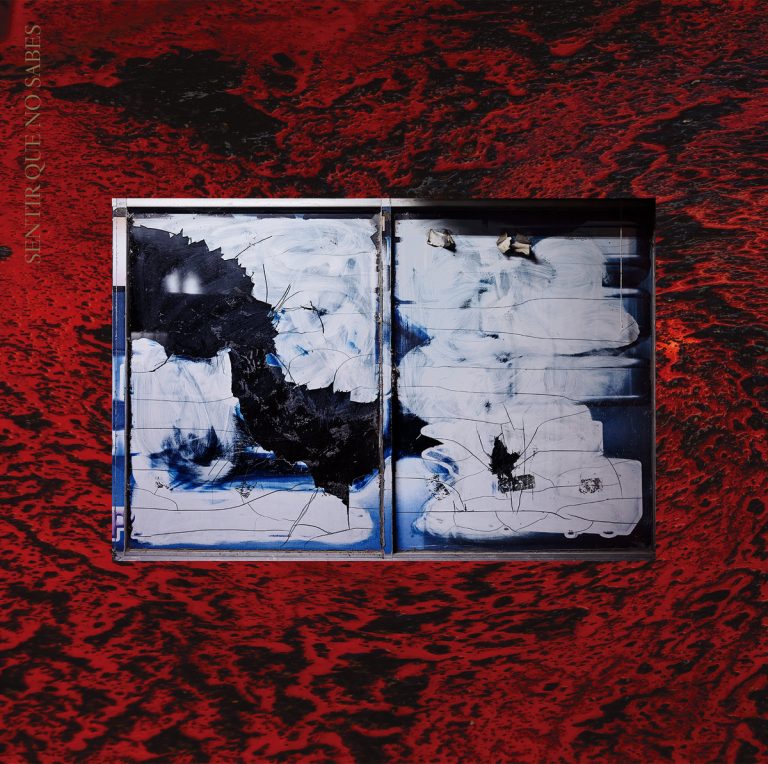With her latest album, Sentir Que No Sabes, Mabe Fratti continues to visit liminal and labyrinthine spaces, navigating states of being that frequently lead to abiding insights. Building on 2019’s Pies Sobre La Tierra, 2021’s Será Que Ahora Podremos Entendernos and 2022’s Se Ve Desde Aqui – as well as last year’s album with partner Hector Tosta as Titanic – she juxtaposes balmy euphonies and startling discordance, her instrumental choices unfurling as precise complements to her vocal and lyrical forays.
The album launches with “Kravitz”, undergirded by a garage-y and reverberant riff. “Quizás haya oídos en el techo” (“Maybe there are ears in the ceiling”), Fratti moans, evoking uncertainty, anxiety, paranoia. “Se supone que puedo opinar” (“I’m supposed to have an opinion”), she adds, addressing the shakiness of identity (anonymity, inconsequence) from a big-picture perspective, as horns offer unpredictable garnishes. If the 2021 LP showed Fratti straddling a sense of remove from and involvement with the busy world, this album features her in greater retreat, though what she retreats to is every bit as vast if not vaster than any external vista. That’s not to say that Fratti finds nibbana or even sustainable solace in her distancing from commotion and commerce. To the contrary, the inner domain can be more turbulent than the outer. Illustrating this vision, Fratti interweaves synths, drums, piano, and trumpet accents; sounds gather, form wholes, then dissipate, pointing to the fleeting nature of cohesion, clarity, and stability.
With “Pantalla azul”, Fratti explores consternation via oblique observations and declarative non sequiturs. The track spotlights her at her most melancholically lounge-y, a retro piano part crossed with a bassy drone. The cello, percussion, and staccato piano mix on “Oídos” swirls and eddies as Fratti examines the shadow of capitalism, the drive to produce despite the psychological cost. A breezy trumpet line follows her as she sings, “Cuantas hojas vacías / Tenemos que llenar?” (“How many empty pages / do we have to fill?”), mining balances between fragility and roughness, fluidity and cacophony. Fratti again reports on existential and cosmic flux: peace is portrayed as elusive, beauty as ephemeral, and human life as a wonder and a perplexing evolutionary phenomenon.
“Enfrente” combines a beat at once dancey and trashy, Fratti offering one of her more sensual vocal takes. Here she considers the distance between people, how relationships are composed of disconnection as much as intimacy. On an individual level, too, fragmentation and integration coexist. We embody turmoil as much as stasis. “Alarmas olvidadas” extends this inquiry. “¿Cómo te atreves a llamarme por un nombre que no puedes definir?” (“How dare you call me by a name you can’t define?”), Fratti asks, as synth, cello, and percussion parts converge and diverge, serving as metaphors for the expansion and contraction of life, relationships, consciousness itself.
The instrumental “Elastica II”, meanwhile, blends rock-leaning riffs with trebly clamor, an adventurous cross between adrenalized pop and classical avant-garde. “Márgen del indice” is a punk-y art-pop venture, a spry vocal and lurching cello veering into a jazz-noise venture, Fratti surrendering Aristotelian notions of unity. “Descubrimos un suspiro” merges the cinematic, fantastical, and postpunk, a track that could appear on a soundtrack for an on-again, off-again romance, a sci-fi coming-of-age tale, or a gritty plot re: drug abuse spinning out of control in some extraordinarily exotic locale.
“No voy a regresar” (“I’m not going to come back”), Fratti moans on “Angel nuevo”. She may be describing a respite from the bedlam of modern life or imagining herself in some after-death bardo. In either case, she steers the fine line between idealism and escapism, questioning how the mind often invests in a conceptualized future in order to disengage from the less-than-pleasant moment at hand. The sonic mix is dramatic, conjuring operatic sequences, scenes of ghosts marching across a bridge into sunlight (or moonlight), perhaps toward their next lives, their karma trailing in front of and behind them.
In this way, Fratti yokes the elements of her gorgeous and ambitious undertaking: austerities, excesses, ambivalences, ambiguities, sorrow, courage, madness. Wisdom, too, is present, and perhaps claims the day. Vocally, lyrically, and sonically, Fratti captures the way in which the micro and macro are forever colliding, shrinking, erupting, dissolving around us and, more pressingly, within us.


